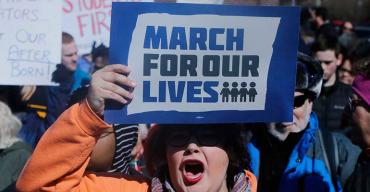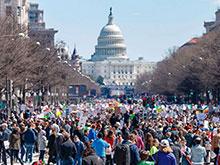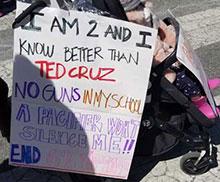
Democrats sure are banking on millennials to bring home the vote in November. Hence, the frenzy to control the Marjory Stoneman Douglas High School survivors' March for Our Lives last Saturday, and afterwards to propagandize the size of the Washington, D.C. crowd -- turning 200,000 participants into more than 800,000.
But, maybe millennials aren't the "voice of a generation on gun control," as the Miami Herald called them, and maybe they aren't going to "turn the tide of a long-simmering debate" as progressives desperately hope.
Maybe what we're seeing is a kind of false positive.

There's certainly evidence progressives should worry about.
Gallup and the Pew Research Center, both reliable polling sources, specifically surveyed millennials and found they are no more liberal on gun control than their parents or grandparents -- despite diverging from their elders on the legalization of marijuana, same-sex marriage and other social issues.
As a matter of fact, "there's some evidence that gun control is supported less by people 30 and under now than in previous generations," Kyle Perisic reports in a Daily Signal story about the two polls.

Additionally, according to the University of California at Los Angeles’ annual CIRP survey, support for gun control has declined by about 10 percentage points for respondents born in 2000, compared with respondents born in the early 1980s.
"Sometimes people surprise us, and this is one of those instances that we don't know why," says Frank Newport, editor-in-chief of Gallup.
Over the past three years, his polling organization asked the under-30 crowd whether gun laws in the U.S. should be made more strict, less strict or kept as they are now. On average, people between the ages of 18 and 29 were 1 percentage point more likely to say gun laws should be more strict than the overall national average of 57 percent.
"Young people statistically aren't that much different than anybody else," Newport says.
Polling by the Pew Research Center last year came to similar conclusions: 50 percent of millennials, between the ages of 18 and 36, said gun laws in the U.S. should be more strict. That share was almost identical among the general public, according to Kim Parker, director of social trends research at Pew.
Pew did find significant differences between millennials and older generations on two gun control proposals -- banning assault-style weapons and high-capacity ammunition magazines that hold more than 10 rounds. The results showed that a greater share of millennials -- both Republicans and Democrats -- are more conservative when it comes to those bans compared with Generation Xers, baby boomers and members of the silent generation.

In truth, many demographers don't even include the high school activists who have been organizing since the Florida shooting in the "millennials" category. Instead, they call the under-18s "Generation Z." Pollsters generally don't count the views of those under 18, so there probably won't be national polling on this group until more of them are officially adults.
Democrats nevertheless are counting on Parkland survivors to influence new voters, to move the needle in their favor. Certainly, it could happen. The Douglas High School students speaking out today are luminary teens who are reminding America that the shooting was not a freak accident or a natural disaster but the result of actual human decisions.
But don't forget the tremendous national outrage after the shooting that took the lives of 20 Sandy Hook Elementary School students on Dec. 14, 2012 in Newtown, Conn. For the most part, it fizzled like a wet firecracker.
Within hours of the shooting, a "We the People" petition was started asking the White House to "immediately address the issue of gun control through the introduction of legislation in Congress," and the gun control advocacy group the Brady Campaign to Prevent Gun Violence reported that an avalanche of donations in the hours after the shooting caused its website to crash.
Five days later President Obama announced he would make gun control a "central issue" of his second term, and he created a gun violence task force, to be headed by Vice President Joe Biden.
In the end, though, the Sandy Hook outrage had its most significant impact on Connecticut law and the changes it brought about in the Nutmeg State. That ultimately may be the result after Parkland -- Florida will feel the greatest shift in measures to harden schools against firearms attacks, while sentiment elsewhere in the nation recedes.
As the Pew's Parker says, "What we're hearing now in the immediate aftermath of Parkland might not be representative of what a whole generation feels."
Reach Nancy Smith at nsmith@sunshinestatenews.com or at 228-282-2423. Twitter: @NancyLBSmith
READ MORE FROM SUNSHINE STATE NEWS
Carlos Curbelo's, Seth Moulton's Bill Banning Bump Stocks Gains Ground on Capitol Hill
Gabby Giffords Working With Florida Democrats on Gun Control


